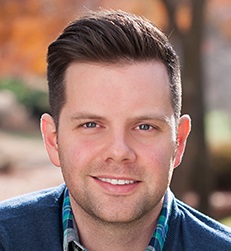By Bob Allen
With his writing career in full swing, faith-and-culture author Jonathan Merritt ended a 2009 USA Today commentary with a challenge to his fellow evangelical Christians.
 “Now is the time for those who bear the name of Jesus Christ to stop merely talking about love and start showing love to our gay and lesbian neighbors,” Merritt wrote. “It must be concrete and tangible. It must move beyond cheap rhetoric. We cannot pick and choose which neighbors we will love. We must love them all.”
“Now is the time for those who bear the name of Jesus Christ to stop merely talking about love and start showing love to our gay and lesbian neighbors,” Merritt wrote. “It must be concrete and tangible. It must move beyond cheap rhetoric. We cannot pick and choose which neighbors we will love. We must love them all.”
What no one knew at the time, Merritt reveals in a book released April 1, is how personal those words were for the son of a former Southern Baptist Convention president active in his father’s Atlanta-area megachurch.
“I was not just asking that we do a better job loving our neighbors,” Merritt, 31, says in an excerpt from Jesus Is Better Than You Imagined published March 28 in Christianity Today. “I wanted to know I was loved too.”
Merritt, senior columnist for Religion News Service, in previous books Green Like God and A Faith of Our Own dealt with social issues of environmental protection and younger evangelicals’ disconnect with culture war issues of the Religious Right. This time he delves into a yearlong inward journey to recover a faith that had grown spiritually dry.
He describes meeting God in unexpected places, including the silence of a desert monastery, amid hopelessness in Haiti and even in the sacrilege of a religious-themed nightclub mocking hypocrisy in American Christianity.
He also reveals being the victim of childhood sex abuse at the hands of an older boy, confusion about his own sexual attractions and the disgrace of being “outed” by a gay man after a rendezvous in a parked car that Merritt describes in the book as “physical contact that fell short of sex but went beyond the bounds of friendship.”
Merritt said in an RNS column March 31 that his decision to share those parts of his story “wasn’t a career move or a brazen attempt to sell more books.” Rather, it’s because he believes honesty provides a path to holding on, as he says in the book, to “a thread called grace.”
 By the time he was about 10, Merritt says, isolation and pain prompted thoughts of suicide. He hid a note in a bedroom dresser so if he ever mustered the courage to kill himself his parents would understand. He tore it up over fear that if his mother were to stumble across it while cleaning his room, he would be put in a mental institution.
By the time he was about 10, Merritt says, isolation and pain prompted thoughts of suicide. He hid a note in a bedroom dresser so if he ever mustered the courage to kill himself his parents would understand. He tore it up over fear that if his mother were to stumble across it while cleaning his room, he would be put in a mental institution.
Things got better as he got older. He was attracted to pretty girls, he says, but also occasionally felt drawn to other boys. He dated girls in high school, but his emotional insecurity always kept him from getting too close to a girlfriend.
After his 2009 column in USA Today, Merritt, a graduate of Jerry Falwell’s Liberty University and Southern Baptist-affiliated Southeastern Baptist Theological Seminary, was contacted by a gay blogger named Azariah Southworth interested in continuing the dialogue.
They communicated for months by email and text message before arranging a face-to-face meeting when Merritt was in Chicago for a Christian conference in 2010. Merritt says he came away from the experience confused, but soon after that the communication between the two came to an end.
That changed abruptly two years later. In a July 20, 2012, article in The Atlantic, Merritt opposed a boycott of Chick-fil-A because of the company’s support of organizations against gay marriage.
Southworth responded with a July 23 blog alleging that Merritt is gay and explained in Salon that it was hypocritical for him to say publicly that homosexuality is a sin while enjoying the company of men.
Merritt answered in a blog interview with Ed Stetzer of LifeWay Research that he behaved inappropriately but doesn’t identify as gay “because I believe there can be a difference between what one experiences and the life that God offers.”
Merritt says in his new book when people today ask how he identifies himself, he doesn’t know what to say. “It doesn’t feel authentic to label the whole of my being by feeling and attractions, and my experience has been that those parts of me tend to be somewhat fluid,” he writes.
“One day I may feel more one way than another, and the next I feel a little differently,” he says. “I am far more than my feelings, so I don’t answer that question. Not because I want to evade others but because I want to stay true to myself.”
Merritt says his spirituality shapes the essence of who he is far more than his sexuality. “I am wholly wrapped up in my pursuit of Christ and his amazing grace,” he writes.
Merritt says he doesn’t know if his feelings as an adolescent are connected to his childhood experiences of abuse or are a part of himself that would have emerged anyway. “I’m certain I don’t know the answer to this question, and I’m not sure anyone does except God,” he writes in the book.
“It’s dangerous to assume that those who are attracted to others of the same gender must have had abuse in their past,” he added in his column for RNS.
Previous stories:
